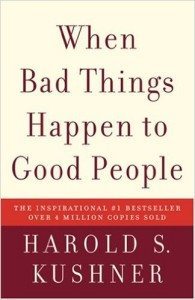When Bad Things Happen to Good People
 The “words of wisdom” I heard most often from friends and family members was, “God never gives us more than we can handle.” Unfortunately, this is simply not true. There are many people who crack under the strain of suffering and lose all hope for the future.
The “words of wisdom” I heard most often from friends and family members was, “God never gives us more than we can handle.” Unfortunately, this is simply not true. There are many people who crack under the strain of suffering and lose all hope for the future.
The one thing all of these theories have in common is they all “assume that God is the cause of our suffering and they try to understand why God would want us to suffer.” The author spends the rest of the book seeking an alternate explanation for suffering other than God causing it.
The author finds an answer to his question of why bad things happen to good people in the Book of Job. To explain his analysis of the Book of Job would take much too long and probably put most of you to sleep, but I can summarize the conclusion he reaches.
The author decides that when bad things happen to good people, it is not because God intended it or planned it. He says bad things happen (to good and bad people) because we live on earth, and earth is not a perfect place. It is not the Garden of Eden. It is a place where both good and evil exist, and therefore where both good and evil occur. And, the author says, God does not control every single thing that happens on earth. God does not sit up in Heaven picking and choosing whose mother will get cancer or whose baby will die of SIDS. These things happen because the world after sin is not within God’s complete control. After Adam and Eve sinned, the world became a place of chaos. And it is chaos that is partially responsible for suffering.
The other reason for suffering is free will. God does not control every act of every person on the earth. In fact, He can’t because we have free will. And much of the suffering that occurs in this world is caused by men/women who choose to commit evil. I realize this is not the case for our SIDS babies but this point is made to support the point that God, in fact, is not in complete control of what happens on earth. He can’t be in complete control because of sin and chaos and free will.
When I first read this theory of how God is not in complete control after all, I was very disconcerted. I mean I had always actually believed those cliches about God having a reason for everything and never giving me more than I could handle. It was only after I lost my baby that I couldn’t believe that anymore. And the author says this is exactly right, it is only those who have not suffered a great tragedy who can easily believe those things. Once you have to face tremendous suffering, those explanations just don’t make sense anymore.
The good news is, if you are able to accept the fact that God is not controlling every aspect of your life, then you don’t have to be mad at Him anymore for taking your baby away from you. He didn’t. And so we can turn to Him for help. The author says, “If we can bring ourselves to acknowledge that there are some things God does not control, many good things become possible.” Those good things are that we are able to turn to God for help, we can be angry at what has happened to us without feeling that we are angry at God, and we can maintain our belief that God is our ally in every situation.
The last point the author makes in the book that really changed my perspective on suffering and loss is that regardless of why you think bad things happen to good people, a critical element to healing and surviving loss is to find a way to redeem the pain. “Pain makes some people bitter and envious. It makes others sensitive and compassionate. It is the result, not the cause, of pain that makes some experiences of pain meaningful and others empty and destructive.”
To redeem pain, we must move beyond the question of “why did this happen?” and find an answer to the question “what can I do now that it has happened?” Some people find an answer by going out into the community and helping others through church or volunteer activities. Some people commit themselves to being a better parent to surviving or subsequent children, to being a more loving and understanding spouse, to being a more compassionate friend. There are as many ways to respond to pain as there are people who suffer it. Everyone has to find his/her own way. The critical factor is to choose a path that results not in bitterness and hopelessness but in healing and hope and love.

